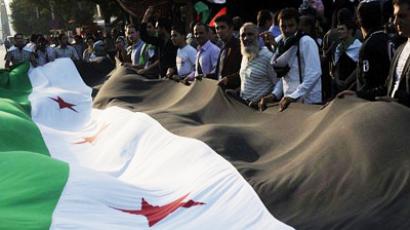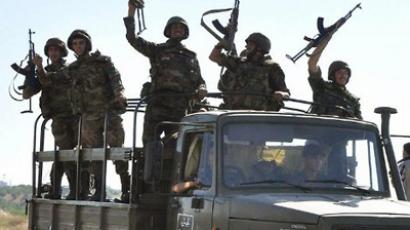Syria's Assad grants general amnesty 'for uprising crimes'
President Bashar al-Assad has issued a decree granting general amnesty for crimes committed during the Syrian uprising which started in March 2011, the official government news agency SANA reported on Sunday.
The amnesty reportedly covers those who took part in peaceful demonstrations, carried unlicensed weapons and those who have handed their weapons over to authorities before the end of January, as well as army deserters who fled their military service, but turn themselves in before January 31.It was not announced, however, how many prisoners would be affected by the initiative. Since the outbreak of the uprising against President Assad, he has freed 3,952 prisoners. Thousands more are still being kept in prisons, according to international human rights organizations.The release of all arrested protesters has been one of the Syrian opposition’s main demands, which has also been set in the country’s crisis settlement plan proposed by the League of Arab States. Observers from this regional organization are currently working in Syria.Figures cited by the United Nations state that more than 5,000 people have fallen victims to Assad's crackdown during the nationwide protests. Syrian authorities, on the other hand, largely blame high death toll to armed gangs and say that 1,100 soldiers and police staff have been killed.Meanwhile the Arab League said this week it would delay sending more monitors to Syria after the attack on an observer team. One of the league's numerous observers has already quit the mission, describing it as a "farce".In an interview with Egyptian television, the Arab League chief Nabil al-Arabi admitted the LAS mission in Syria is not working as planned and that he fears a civil war may break out there if the situation does not change drastically. He echoed Sheikh Hamad bin-Khalifa Al-Thani – Qatari leader and a key supporter of the league – who said Thursday that a positive outcome for the mission was unlikely.The Emir of Qatar went as far as suggesting that Arab countries should send troops into Syria to stop government forces killing civilians. He made this statement Saturday during his interview with US news channel CBS which will be aired this Sunday in the news program 60 minutes. Speaking about the conflict in Syria Sheik Hamad said, "For such a situation to stop the killing, some troops should go to stop the killing."This is the first time an Arab leader has publicly called for military intervention in Syria. Qatar was the first Arab country to join the NATO-led operation in Libya.
Sara Marusek, a Middle East researcher at Syracuse University, told RT that this exposes the double standards of the Arab League. “This call for interference or intervention in Syria really is quite ridiculous when one looks at the undemocratic past and present of these Gulf countries and how and why they believe they can use force to interfere in a country that is suffering from a civil war.”
RT contributor and independent journalist Lizzie Phelan says that Assad’s recent move has received mixed reaction among Syrian people.“The reaction is very much seen as though the president is being very generous. He is releasing more people despite the fact that the situation in some parts of the country is still extremely tense. There are some concerns in some sections of the Syrian population that amongst the many people that are being released, there will be some criminal elements who will slip through the net.”Pepe Escobar, a columnist and correspondent for the Asia Times, believes the Arab League is, in effect, controlled by the Gulf Cooperation Council (GCC), a union of six Sunni Arab monarchies – Saudi Arabia, Kuwait, Qatar, Bahrain, the United Arab Emirates and Oman. In his view, the GCC is backed by the United States and NATO, and seeks to depose secular Arab governments, as it already has in Libya, and is trying to do in Syria. “This is a total clash between the Persian Gulf monarchies against Arab secular republics,” he told RT. “It was the case with Libya, it’s the case with Syria as well. Other members of the Arab League I’m not so sure. Even Tunisia is saying that if there is an Arab League coordinated intervention in Syria, this could be a horrible business because they know about the possible repercussions. Egypt is not saying anything either. So, the conflict inside the Arab League is not a conflict at all. It’s a sort of hegemony by the GCC[…] So on one side we have the US, NATO, the GCC – the Persian Gulf monarchies, on the other side we have Russia, China, Iran and a great deal of the developing world for that matter, who don’t want an overall war in the Middle East starting in Syria”.














